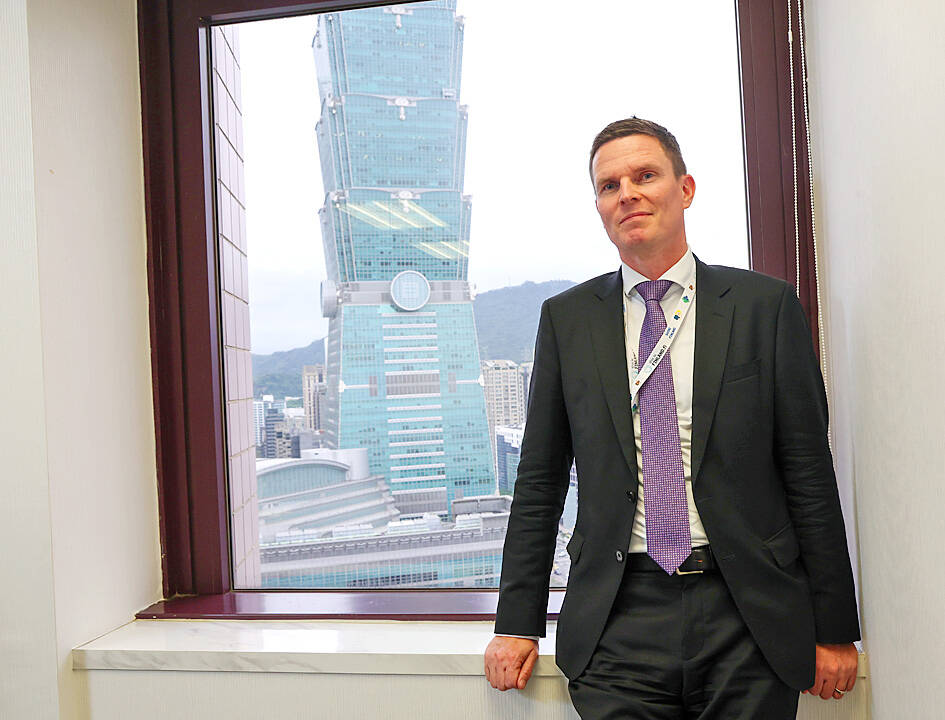While submarine cables are occasionally damaged accidentally, the occurrence of several incidents over a short time “inevitably raises suspicion about the possibility of deliberate sabotage,” Finland’s representative to Taiwan said in an interview last week.
On Nov. 17 and 18 last year, the C-Lion1 cable between Finland and Germany and the BCS East-West Interlink cable between Lithuania and Sweden were cut. The following month, the Estlink 2 electricity cable connecting Estonia and Finland, along with four data cables, were cut in the Finnish exclusive economic zone.
The Russian tanker Eagle S, which set sail from a Russian port, appeared near the scene of the incident involving the C-Lion1 cable, and its anchor was missing. Finnish authorities are investigating the incident for suspected sabotage.

Photo: CNA
Chinese bulk carrier Yi Peng 3 (伊鵬3) was seen near the spot where the Estlink 2 cable was cut, which is in Swedish territorial waters.
On Jan. 3, Taiwan reported undersea cable damage in waters off Yehliu (野柳), believed to have been caused by the Cameroon-registered freighter Shunxing-39 (順興39號), owned by a Hong Kong-registered company.
Finland Trade Center in Taiwan Director Lauri Raunio told the Central News Agency in an interview on Wednesday that as Taiwan’s submarine cables were also damaged by a foreign cargo ship, it is difficult to determine whether the incident was accidental or intentional, but the situation has raised suspicions.
Meanwhile, Raunio, who has headed the center since 2022, said his country and Taiwan could complement each other’s strengths and work closer together on technology, green energy, civil resilience and more.
Finnish Customs data showed that two-way trade between Taiwan and Finland rose from about 600 million euros (US$615.29 billion) in 2019 to 1.3 billion euros annually, he said.
Taiwan’s exports of semiconductors, microelectronics and electro-mechanics contributed to the significant increase in bilateral trade, he said.
“I’m very happy to see that the overall trade between Finland and Taiwan has more than doubled in the past three to four years,” he said.
Praising Taiwan’s semiconductor industry, he said that Taiwan’s biggest company in Finland is MediaTek Inc (聯發科), the Hsinchu-based smartphone IC designer, which has a research-and-development center in Oulu, Finland.
Finland is renowned for technology patents, Raunio said, adding that a report published last year by the European Patent Office showed that Finland had applied for the fourth most patents per capita among all European countries, with 422.1 applications per 1 million inhabitants.
“We [Finland] have a pretty solid base of software engineers, combining the hardware from Taiwan [and] software from Finland,” which complement each other’s strengths, he said.
Aside from cooperation in the high-tech sector, Finland’s expertise in geothermal energy, hydrogen power and solid recovered fuels, among others, could help Taiwan as the nation seeks to phase out nuclear power, he said.
Finland also has a robust civil security system, including mandating that new buildings have civil shelters since the 1930s, which could be a focus point for exchanges with Taiwan, Raunio added.

The CIA has a message for Chinese government officials worried about their place in Chinese President Xi Jinping’s (習近平) government: Come work with us. The agency released two Mandarin-language videos on social media on Thursday inviting disgruntled officials to contact the CIA. The recruitment videos posted on YouTube and X racked up more than 5 million views combined in their first day. The outreach comes as CIA Director John Ratcliffe has vowed to boost the agency’s use of intelligence from human sources and its focus on China, which has recently targeted US officials with its own espionage operations. The videos are “aimed at

STEADFAST FRIEND: The bills encourage increased Taiwan-US engagement and address China’s distortion of UN Resolution 2758 to isolate Taiwan internationally The Presidential Office yesterday thanked the US House of Representatives for unanimously passing two Taiwan-related bills highlighting its solid support for Taiwan’s democracy and global participation, and for deepening bilateral relations. One of the bills, the Taiwan Assurance Implementation Act, requires the US Department of State to periodically review its guidelines for engagement with Taiwan, and report to the US Congress on the guidelines and plans to lift self-imposed limitations on US-Taiwan engagement. The other bill is the Taiwan International Solidarity Act, which clarifies that UN Resolution 2758 does not address the issue of the representation of Taiwan or its people in

US Indo-Pacific Commander Admiral Samuel Paparo on Friday expressed concern over the rate at which China is diversifying its military exercises, the Financial Times (FT) reported on Saturday. “The rates of change on the depth and breadth of their exercises is the one non-linear effect that I’ve seen in the last year that wakes me up at night or keeps me up at night,” Paparo was quoted by FT as saying while attending the annual Sedona Forum at the McCain Institute in Arizona. Paparo also expressed concern over the speed with which China was expanding its military. While the US

SHIFT: Taiwan’s better-than-expected first-quarter GDP and signs of weakness in the US have driven global capital back to emerging markets, the central bank head said The central bank yesterday blamed market speculation for the steep rise in the local currency, and urged exporters and financial institutions to stay calm and stop panic sell-offs to avoid hurting their own profitability. The nation’s top monetary policymaker said that it would step in, if necessary, to maintain order and stability in the foreign exchange market. The remarks came as the NT dollar yesterday closed up NT$0.919 to NT$30.145 against the US dollar in Taipei trading, after rising as high as NT$29.59 in intraday trading. The local currency has surged 5.85 percent against the greenback over the past two sessions, central